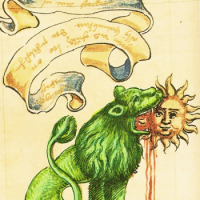Mesaĝoj: 52
Lingvo: English
orthohawk (Montri la profilon) 2014-septembro-28 13:53:32
Bemused:As I have said before, we DO have a plural you: "you". It's the singular that's "missing" (I put that in quotes because it's still there {in various forms}, just not used by the vast majority of the population).
I believe English would work better with:
- a plural you. There are work arounds such as "you all" or "all of you", but a single word would avoid the need for work arounds.
Alkanadi (Montri la profilon) 2014-septembro-28 15:04:33
orthohawk:What is the singular version of "you"?
As I have said before, we DO have a plural you: "you". It's the singular that's "missing" (I put that in quotes because it's still there {in various forms}, just not used by the vast majority of the population).
mbalicki (Montri la profilon) 2014-septembro-28 15:47:37
Alkanadi:What is the singular version of "you"?Singular second-person pronoun (equal in meaning to English “thou”) is ci. If you'd like to learn more, check out my post on the first page of this thread.
EDIT: Oh, now I see thou wast asking about English singular second-person pronoun.
 Then, unknowingly I've answered thy question. I hope it will be easy for thee to find all the forms of English singular second-person pronoun in this short post.
Then, unknowingly I've answered thy question. I hope it will be easy for thee to find all the forms of English singular second-person pronoun in this short post. 
EDIT2: Also, thee should check out previous posts, where orthohawk and I were talking about the simplified and more modern version of dealing with this pronoun. It may be more pleasing for thee, because it doesn't make the distinction between the subject and object form and the verb conjugation is equal to singular third-person conjugation. If thee is interested, then thee can also check out few dialects of English, in which T–V distinction has persisted.
Kristal (Montri la profilon) 2014-septembro-28 16:47:21
mbalicki:So our loss of the "thorn-letter" confused us with the modern alphabet into mistaking the thorn-letter for the letter "y" and that is how thee became ye. I looked-up "thee" in a dictionary and, now, I think I understand. The words thee, thou, and thyself are like the French words tu, toi, & toi-même. Is that correct? No, that can't be right; vous needs to fit in somewhere for the plural.Alkanadi:What is the singular version of "you"?Singular second-person pronoun (equal in meaning to English “thou”) is ci. If thou'd like to learn more, check out my post on the first page of this thread.
EDIT: Oh, now I see thou wast asking about English singular second-person pronoun.Then, unknowingly I've answered thy question. I hope it will be easy for thee to find all the forms of English singular second-person pronoun in this short post.
I'll shut up now and subscribe to the thread.
orthohawk (Montri la profilon) 2014-septembro-28 19:50:40
Kristal:Actually no. "ye" was the form in Middle English which was a direct descendent of "ge" in Anglo-Saxon, with the "g" being pronounced as a "y" before a front vowel (of which "e" is one). "Ye" was the original subject form of the second person plural pronoun ("you" was/is the object form); it has nothing to do with "thee":
So our loss of the "thorn-letter" confused us with the modern alphabet into mistaking the thorn-letter for the letter "y" and that is how thee became ye.
"Ye" is also sometimes used to represent an Early Modern English form of the word "the" (traditionally pronounced /ðiː/), such as in "Ye Olde Shoppe". In this transcription the letter which resembles a 'Y' is actually a thorn (þ), the predecessor to the modern digraph "th". The word "The" was thus written Þe. Medieval printing presses did not contain the letter thorn, so the letter y was substituted owing to its similarity with some medieval scripts, especially later ones. This orthography has sometimes led speakers of Modern English to pronounce "ye" as /ji:/.
mjdh1957 (Montri la profilon) 2014-septembro-29 10:58:58
But in Bristol, the conjugation is 'tha bist', rather than the more standard 'thou art'. Same form as the modern German 'du bist'.
You hear thou/thee/tha in Britain a lot less nowadays than in the past.
nornen (Montri la profilon) 2014-septembro-29 16:48:11
mjdh1957:In the Bristol dialect of English, 'thou/thee' are pronounced more like 'tha', it's pronounced similarly in Yorkshire as well.The form "thou bist" (or classicaly "thou beest" from the same root as "be" (infinitive), "ybe" (past participle) etc) has already been in use as an alternative form to "art", when thou was still common.
But in Bristol, the conjugation is 'tha bist', rather than the more standard 'thou art'. Same form as the modern German 'du bist'.
You hear thou/thee/tha in Britain a lot less nowadays than in the past.
robbkvasnak (Montri la profilon) 2014-septembro-29 17:04:26
nornen (Montri la profilon) 2014-septembro-29 17:18:35
robbkvasnak:It is the old story of the clash of two Germanic cultures in Olde England, the West Germanic (bist) and the North Germanic (art). The North Germanic (Scandinavian) came with the marauding vikings. The West Germanic comes from the invading Fresians-Angels-Saxons. The losers are the speakers of Celtic.Now this an awesome resumé of British linguistic history (up to (excluding) the influence of the Frenchmen, when everything started to go down the drain). Chapeau!
Although, me being West Germanic, I think it is a bit unjust to only call the Northerners "marauding". For political correctness I would prefer to call the Westerners "marauding", too.
Just on a side note, in Trier (Treveris) the verb sein is conjugated as follows:
Äisch sein
Dau bast
Hän as
A small step from "dau" to "thou".
bartlett22183 (Montri la profilon) 2014-septembro-29 18:12:13


 the original post had to do with pronouns in Esperanto, not the history of English grammar. Thank you.
the original post had to do with pronouns in Esperanto, not the history of English grammar. Thank you. 





